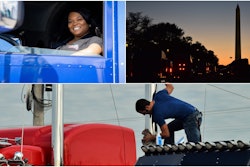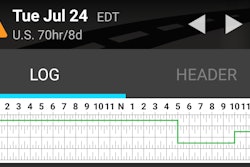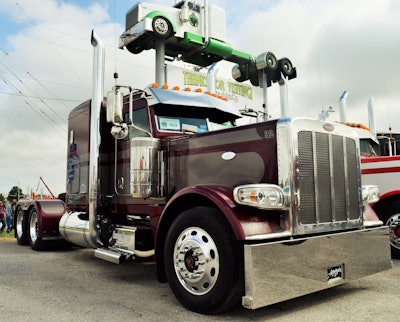 The Federal Motor Carrier Safety Administration held its latest hours of service listening session in conjunction with Guilty by Association Truck Show in Joplin, Mo., at 4 State Trucks headquarters, long popular with owner-ops and small fleets. Pictured: Illinois-based small fleet owner-op Dave Marti’s relatively recent addition to the fleet (a 2018 Peterbilt 389 Cat-powered glider) under the iconic “Mobsled” high in the air outside 4 State.
The Federal Motor Carrier Safety Administration held its latest hours of service listening session in conjunction with Guilty by Association Truck Show in Joplin, Mo., at 4 State Trucks headquarters, long popular with owner-ops and small fleets. Pictured: Illinois-based small fleet owner-op Dave Marti’s relatively recent addition to the fleet (a 2018 Peterbilt 389 Cat-powered glider) under the iconic “Mobsled” high in the air outside 4 State.Friday, September 28, occasioned one of the latest events in the Federal Motor Carrier Safety Administration’s round of outreach to the trucking industry on the hours of service regulations. The venue, 4 State Trucks’ parts and service headquarters in Joplin, Mo., during the Guilty by Association Truck Show, provided an opportunity of a character markedly different from the sterile confines of conference and meeting rooms that typify federal hearings and events. The session was held inside the bays of the old shop area directly behind the 4 State store, and FMCSA Administrator Ray Martinez and other officials dressed down, in keeping with the casual atmosphere.
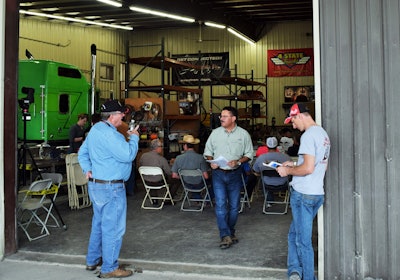 Martinez himself greeted truckers at the entry point with a flyer that outlined the basics of the FMCSA’s advance notice of proposed rulemaking on hours, also detailed in this linked piece of prior Overdrive reporting.
Martinez himself greeted truckers at the entry point with a flyer that outlined the basics of the FMCSA’s advance notice of proposed rulemaking on hours, also detailed in this linked piece of prior Overdrive reporting.Officials were no less serious, however, about a desire to hear from truckers on potential reforms aimed at, in the words of Administrator Martinez, addressing “a safety issue we need to be paying attention to,” one he’s heard about from countless drivers, he said: “the lack of flexibility in the hours of service.”
As previously reported, the agency called for comments on potential harmonization of short-haul/time-card rules with rules for truckers keeping logbooks, of a fashion — a potential move from 12 to 14 hours as a maximum on-duty window for such drivers. More importantly for most owner-operators in Overdrive‘s audience, the agency is also looking closely at specific items commonly remarked upon as flawed in the current hours rule:
- Potential to extend drivers’ 14-hour daily limit in various ways;
- Allowing drivers to split 10-hour off-duty periods into segments, to generally allow more driver discretion in how they use time;
- Revising (or eliminating, as the case may be) the 30-minute break requirement.

The Owner-Operator Independent Drivers Association celebrated its 45th anniversary at the GBATS event. As such, Texas-headquartered owner-operator Steve Davenport, a longtime OOIDA member as well as a member of its Board of Directors, started commentary by urging FMCSA to recognize the burden the lack of flexibility places on owner-operator businesses, which in many cases hinge on having operational flexibility to serve the customer. “Capitalism works best when” freedoms granted in the constitution extend to the regulated community, he noted, with “the freedom and the privacy to run your business as you want to.”
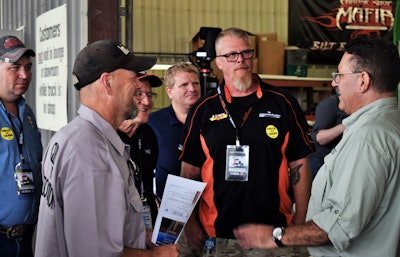 Ahead of the panel, Martinez chatted with those in attendance, including owner-operators, OOIDA reps and 4 State Trucks’ Bryan Martin. Pictured from left: OOIDA Executive Vice President Lewie Pugh, 4 State Trucks’ Bryan Martin, OOIDA President Todd Spencer, FMCSA Associate Administrator for Enforcement Bill Quade, owner-operator George Parker, and FMCSA Administrator Ray Martinez.
Ahead of the panel, Martinez chatted with those in attendance, including owner-operators, OOIDA reps and 4 State Trucks’ Bryan Martin. Pictured from left: OOIDA Executive Vice President Lewie Pugh, 4 State Trucks’ Bryan Martin, OOIDA President Todd Spencer, FMCSA Associate Administrator for Enforcement Bill Quade, owner-operator George Parker, and FMCSA Administrator Ray Martinez.OOIDA is one of two organizations the FMCSA specifically recognized with their request for comment on hours as having petitioned the agency for changes. OOIDA’s petition, as Martinez put it, would “allow three hours off duty in the middle of the day and extend the 14-hour [on-duty limitation] three hours on the end.”
Davenport suggested a potential graduated approach to hours of service in order to reduce the burden of limitations on longstanding businesses. “If you can’t serve your customer due to an electronic logging device that limits what you can do,” he said, perhaps “anybody who starts out, as a graduated thing, could be held to a particular standard.” After a certain amount of time, perhaps restrictions on discretion to operate lift in increments, he suggested.
Utah-based owner-operator Doug Smith, an OOIDA board alternate member, lauded a move from 12 hours to 14 for short-haul drivers as “brilliant. I support that wholeheartedly.”
The second petition FMCSA noted it was considering, from the young TruckerNation group, received an endorsement of sorts from Michael Gully, head of the Illinois-based Gully Transportation fleet. As FMCSA head Martinez described the petition, it would in some ways return rules to a simplicity relatively similar to that seen in the hours rules prior to implementation of the 14-hour daily on-duty maximum in 2003, limiting drivers just by a simple 14-hour on-duty limitation with options to split that 14 hours, generally, as they see fit.
The TruckerNation petition would “also eliminate the 30-minute rest break,” Martinez noted.
Gully believed something like it would incentivize safety and return control of it more firmly to the people who should be most invested in it — professional drivers. Given the wide uptake of electronic logging devices after the mandate, “Drivers operating legal now are also operating unsafely,” Gully said he believed. “They’re pushing in ways they did not on paper logs.”
Gully added he felt the industry broadly was in agreement that “the actual hours don’t need to change.” Rather, how drivers are able to use them is the central issue post-14-hour rule. “We have never adjusted to the lack of flexibility, the ability to drive when alert and sleep when fatigued.”
At a previous listening session, FMCSA reps expressed worry over the so-called “never-ending workday” if a rule such as the one TruckerNation proposed was adopted. TruckerNation rep Andrea Marks referenced several studies that show the positive cognitive effects of napping, among other concerns. Marks added, to a round of applause from the audience, that the agency as it moves forward should “be 100 percent committed to providing relief and flexibility to professional drivers. Consideration mustn’t be given to anyone other than the professional drivers. This is a driver-centric issue, and it cannot be anything other than that.”
FMCSA also held a listening session this morning in Orlando, Fla., and the comment period for the official ANPRM via the regulations.gov federal rulemaking portal has a deadline of October 10. Those interested can comment via this link.

